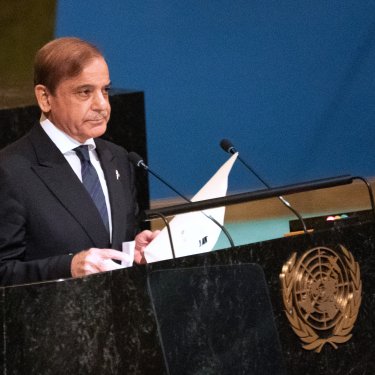RSF urges Pakistani government not to criminalise comments about armed forces

Reporters Without Borders (RSF) calls on the prime minister’s office in Pakistan to immediately abandon plans to make it an offence to criticise the armed forces, as it would pose a serious threat to journalistic freedom. The proposed new law’s wording is extremely vague and its consequences could be disastrous in the run-up to general elections later this year.
Five years in prison for a comment about the army – that is what journalists could face under the proposed legislative amendment that Pakistan’s federal government is planning to submit to parliament.
The draft penal code amendment, which RSF has seen, would create a new type of offence. Under the proposed new section 500A, “whoever makes, publishes, circulates any statement or disseminates information, through any medium, with an intention to ridicule, or scandalise the judiciary or the armed forces of Pakistan or member thereof” could be jailed for up to five years or fined 1 million rupees (3,400 euros).
Excessive powers
The amendment would also have a big impact on the Code of Criminal Procedure. It says any person accused under the new section could be arrested by the police without a warrant and, if jailed, would be denied any possibility of release on bail or release as a result of an out-of-court settlement.
“We call on Prime Minister Shehbaz Sharif to immediately abandon this proposed amendment, which poses all kinds of problems. It creates a very vaguely worded offence that gives the police exorbitant administrative powers over journalists and is clearly designed solely to prohibit any form of comment about the armed forces. And furthermore, its timing could not be worse. Absolutely decisive general elections are envisaged in the coming months in Pakistan and the adoption of such an amendment could constitute a serious obstacle to the democratic process.
Pakistan’s legislative arsenal is already well stocked with disincentives for defamation. Under the Defamation Ordinance of 2002, which is a civil defamation law, plaintiffs can get a court to rule in the favour without having to prove they have suffered any specific damage to their interests or reputation. And under sections 499 and 505 of the Penal Code, defining criminal defamation, a “statement conducive to public mischief” is punishable by up to seven years in prison.
Chilling effect
Muhammad Aftab Alam, the head of the Institute for Research, Advocacy and Development, has no illusions about the government’s intentions.
“This current proposal seems to be part of an ongoing campaign to further criminalise defamation and free speech in Pakistan,” he told RSF. “This law, if passed, could have chilling effect on the freedom of expression in general and journalistic freedom in particular."
Pakistan’s governments have often tried to beef up provisions for penalising any form of criticism of the armed forces, which tend to be seen as the “king-maker” in Pakistani politics. In 2021, then Prime Minister Imran Khan’s administration submitted a proposed law to parliament under which “ridiculing” the armed forces would have been punishable by two years in prison. Parliament ended up rejecting it.
